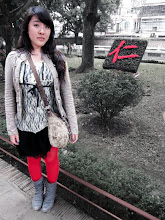Woke up today thinking I’d make it a day of rest. My feet still kind of hurt from a week of continuous walking. There’s a patch of aggravated nerves on my right foot, where the sensation drags when I run my fingers across the skin. I got it from the pair of grandmotherly flats I bought just for walking back at a Texas shoe sale. This is what I get for committing sartorial sins. I really hope the numbness goes away—it’d be nice not to have to touch my Light insurance.
But there’s nothing to keep me tethered to the scant, nunnish quarters of my room. I’d be running air conditioning in beige-walled boredom, and anyway I have to feed myself. I lace myself into Converse knockoffs, acquired after a close encounter with muddied Mother Nature in Sapa— the only vaguely athletic shoes I could find in my suburbanite princess’s closet. I pocket the business card I got from the Buddhist vegetarian place I ate at a couple of days ago, thinking I’d march myself to another cheap serving of turnip cakes, burn off some ennui and some calories in the sun.
En route though, clutching a cup of fresh papaya milk, I see another vegetarian buffet where they dole out sangha-friendly meals by the kilogram. There’s a saffron-garbed monk standing in the doorway when I step up, giving orders while two women pack up rice in takeout boxes. The buffet table’s a mess, scattered with raw vegetables, but I see tins of food open in the back, untouched. A woman takes one look at me and waves me in, in English: “How many?” I answer in Chinese but frown down at my outfit— cap-sleeve button-down, checkered black tights, khaki shorts— nothing in particular to mark me as a foreigner.
I eat across the table from a stranger, a schoolgirl who texts as she nibbles on boiled greens. I notice that I’m using disposable chopsticks to eat off a porcelain plate, while she has Korean-style metal chopsticks and a takeout box. The inconsistency irks me a little. The monk leaves, but the women keep packing their boxes, and as I chew through my vegetable protein the raw greens on the buffet are replaced by covered dishes.
I just noticed I’m writing in literary present. Oops.
On my way back home, I pass a church, probably a bit of sometime photography fodder. It’s a tall glassy confection with airy planes and a look of TV-friendly evangelical glamor—Taipei Truth Lutheran. The next service is in forty-five minutes, and I’m tempted to stay. I duck into the gift shop to wait, start reading a dog-eared gift edition NIV. The syrupy Chinese gospel music makes it hard to concentrate; it’s significantly more unaesthetic than the words of the Psalmist. At the appointed hour, I follow the stamp of faithful footfalls to the lobby, take the elevator that goes up nine floors to the chapel on the second. There are two TV screens and a band up on the stage— three singers, a guitarist, an unoccupied piano. I can see from the cluster of cameras, siege engine-sized machines, that the service will be videotaped.
This service is all music, no Eucharist. We cycle through three praise songs, lyrics displayed across the screens karaoke-style, in traditional characters with English translation. I sing loudly but not without faint appropriative guilt, keep my hands clasped instead of raising them in worship, the way the practitioners next to me do. Because there’s something to occupy me, keep my vocal cords vibrating and the grammar of my psyche firmly in the transitive, I feel less awkward than I would in a temple watching believers light incense. The faint anthropological gauze that divides me from the congregation proper feels fainter than the railings I placed before myself at Tianhou by never stepping up to an altar. To avoid feeling pretentious that way— playing the social scientist researching in the field— I think about the language instead of the people. The traditional Chinese flashes quickly; sometimes I miss words mid-song. I catalog the ones I recognize from reading Wisdom books in simplified. I notice that the English translation is very free but rhymes and scans well. Maybe it happened the other way, a local Christian adapting gospel songs for Chinese.
I like the sermon more than I expect. The handout we’re given— with a graceful font and sorbet colors, probably not inexpensive to print— says it’s about justification through faith. There were headphones with English translation at the first morning service, but now I listen in Chinese about how God’s tormented love for sinners is shown by the sacrifice of His son, how Christ’s deepest anguish was not death but distance from the Heavenly Father, and how human pain can be productive because it glorifies the Lord. It sounds, I think, like the theology of Kazoh Kitamori, whose Theology of the Pain of God we talked about in Chloe Starr’s lit class on Asian Christianity. I wonder airily how much of the sermon’s underlying doctrine is specific to Asian Christianity, to Taiwanese Lutheranism, to this church near Gongguan. I like the preacher, earnest without being theatrical. He’s got a deft touch with the endearing rhetoric of humility, deploys domestic anecdotes that make us all smile. I notice the sharp focus on family, familial love, wonder inanely if this is how Confucian culture chooses to render the Word.
Afterwards I spend the day walking Zhongxiao E. Road, the street running parallel to the Bannan Line. The metro stops are close to each other, connected by bright windows displaying clothes my waistline’s too thick and wallet too thin to buy. When the sky goes gray in the rain-threatening way I’ve come to expect, I duck into the nearest MRT station, ride two lines back home and disappear into the night market.
The Dao of Pandemic
5 years ago


No comments:
Post a Comment